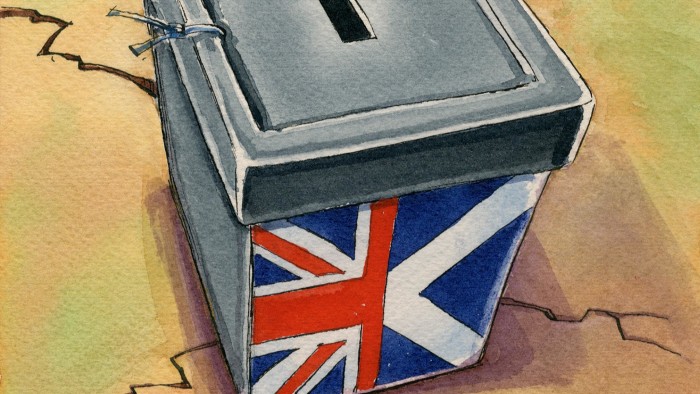Scotland independence vote exposes the established order

Roula Khalaf, Editor of the FT, selects her favourite stories in this weekly newsletter.
This has not been just about Scotland. There is more at stake than the union that in 1707 united the parliaments of England and Scotland.
One way of looking at the campaign for Scottish independence is as a settling of scores between ancient neighbours and rivals. The past few weeks have certainly carried more than a flavour of old resentments. Wrapped up in a tortuous history, though, has been the argument of our times – one about whether we are heading for a world of open or closed, inclusive or exclusive, societies.
Much of what has been happening in Scotland has been uplifting. Citizens the length and breadth of the land have looked into their souls. Some have found Braveheart and the story of English oppression, others David Hume and Adam Smith, figures who defied a Scottishness constrained by geography.
There has been a fierce debate about whether nations are necessarily diminished by the absence of statehood, and about the thin line between honourable patriotism and xenophobic nationalism.
The arguments have been rehearsed and reheard over and again in the genteel Georgian terraces of Edinburgh, in the crumbling housing estates of Scotland’s old industrial belt and on the wild moors of the highlands. The polls suggest that the unionists have won the day, but by a margin too small to be trusted.
It is hard not to see this as a celebration of democracy. Some 97 per cent of eligible Scots have registered to vote. More than 80 per cent may cast a vote in a country where there is nothing unusual about a 50 per cent turnout.
To follow the campaign has been to grasp the depth of honestly held convictions. Among those supporting Alex Salmond’s call for independence are many who disavow the label of nationalist while craving government closer to the people. There are people who will mark their papers with a Yes not because they hate the English, but because they want to shape a society more modelled on Scandinavia than winner-takes-all Anglo-American capitalism.
Among unionists there are those who feel with passion that the achievements, values and institutions of Britain belong to Scotland as much as to England. The case for solidarity was made most eloquently by Gordon Brown, the former British prime minister. No one could gainsay Mr Brown’s Scottishness; few have spoken with such force about wearing this identity along with Britishness.
In depth

Scotland will vote in a referendum on whether to end the 307-year-old union with England
Further reading
Some of the debate has been more prosaic. The absence of David Cameron has been a reminder of how far the Conservatives have fallen since Margaret Thatcher used Scotland as a laboratory for her liberal ideologies. The prime minister has paid only a handful of visits. The most potent nationalist slogan declared that a Yes vote would mean “No more Tory governments – ever”.
Austerity has not helped the British cause. Scotland, as Mr Salmond has proclaimed when making his case for its viability as an independent state, is one of the UK’s richest regions. It has oil. It also relies more heavily than most on state spending, so suffers disproportionately from cuts. Scare stories about an English threat to the National Health Service have fallen on well-tilled ground. Unionists promise further devolution of authority to the parliament at Holyrood, but some Scots have not believed them.
All this has been watched with bafflement and anxiety by Britain’s friends. Spain is far from alone in worrying that an independent Scotland would see secessionist flags flying high across Europe. The US, incredulous as to how a British government could let things get this far, frets about the cohesion of the western alliance in the wake of the implosion of its most loyal ally.
The Europeans especially are right to be worried, whatever the final outcome. The continent has found peace for more than half a century in a patchwork of multi-ethnic states. The kaleidoscope is spinning again. If Britain splinters, the roar of primitive nationalism will be heard across Europe.
Mr Salmond started out with the promise of an inclusive nationalism: self-government in Scotland would not be at the expense of warm ties with the rest of Britain. It was a smokescreen, replaced more recently with a campaign that has carried an air of menace and an undercurrent of intimidation.
The heart of the nationalist case has been one deployed by populists everywhere – the politics of grievance and identity, of a nation done down by foreigners. This has seen nationalists shout down unionists as quislings and insist that Scottishness does not allow for any other allegiance. It is the demonisation of the “other”.
Populism finds its loudest voice in any angry call to arms against the political establishment. In Scotland, this means Westminster; for American nativists it is Washington; and for Marine Le Pen’s xenophobes in France read Brussels and Muslims. We have been here before.
There is no easy answer. Anyone sensible who has been watching events in Scotland will draw unnerving conclusions. If today’s elites do not provide more closely accountable government they will be swept aside by the politics of exclusion. A globalisation that enriches the richest and impoverishes the rest is not sustainable. The case for open, inclusive societies has to be remade.
Internationalism defined the second half of the 20th century; nationalism has elbowed its way back into the 21st.
Comments